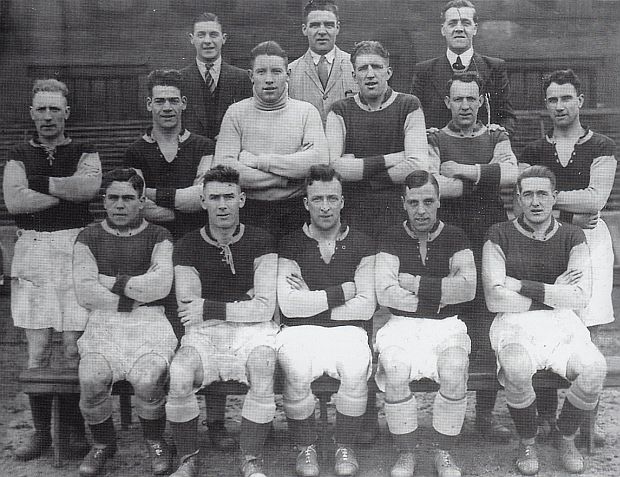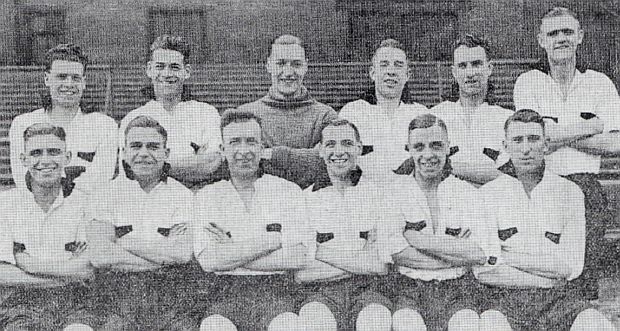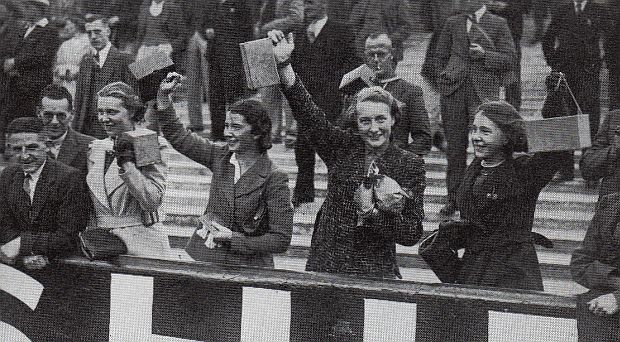The decade had started badly with the Clarets relegated at the end of the 1929/30 season and we were facing 2nd Division football for the first time since that glorious promotion under John Haworth in 1913 which led on to us becoming FA Cup winners and then League champions over the next eight years, either side of the first World War.
Those heady days were gone, but hopes were high that we could get back up at the first time of asking, particularly with George Beel and Louis Page leading the attack. Unfortunately, and immediately, we were on the back foot, losing the first two games of the season, the second of them a massive 8-1 hammering at Tottenham.
Things did improve and big wins followed. We even got our own 8-1 win against Reading. Then a win at Barnsley in early November saw us climb to third place, just behind the top two Everton and Preston and with Beel still in fine goalscoring form we looked set for a promotion chase.
It didn’t happen and a run of eight games without a win in February and March put paid to things. Despite a good finish to the season we were only able to finish in 8th place.
If that was disappointing there was worse to come and the 1931/32 season proved to be a difficult one for Burnley in more ways than one. We were never in the running. We ended the season as low as 19th, just two positions above the relegation places, and in the February we said goodbye to the greatest goalscorer in the history of the club, George Beel.
He was transferred to his home town club of Lincoln City after scoring a record 178 league goals for Burnley in just 316 appearances. It is a record that over eighty years later has not come close to being beaten, and that was despite the fact that he never played in a successful Burnley side.
Interest in the club was dropping and attendances were down to around 10,000 with the club having reached its lowest position. There was a real need for change and it came early and unexpectedly in the 1932/33 season. Having drawn at home to Chesterfield we took a 6-1 beating at Deepdale against Preston after which manager Albert Pickles promptly tendered his resignation, a resignation that was reluctantly accepted by the board of directors.
 |
| Tom Bromilow (top right), alongside future Burnley managers Alf Boland and Billy Dougall |
Former Liverpool player Tom Bromilow was chosen as his replacement, taking over in the October, but he didn’t come with a magic wand and by the end of that season it was same again and another narrow escape from relegation in 19th place.
The saving grace was a good cup run that saw us reach the quarter finals and that was followed by a better season when we climbed into the middle of the table with at least no fears of going down to Division Three as had been the case in the two previous seasons.
Bromilow was beginning to have an impact and strengthened the team ahead of the 1934/35 season by signing Bury’s Alick Robinson and followed that up in October by adding George Brown, a former England international, from Aston Villa.
Brown was the player we had been looking for since the departure of Beel. He scored 21 goals in that first season and again helped us to a mid-table finish, in fact one place higher than the previous season in 12th place.
The season was also boosted with another great run in the FA Cup. Over 47,000 saw us beat Birmingham at home to reach the last four although we failed to reach our second final, going down 3-0 to Sheffield Wednesday at Villa Park in front of almost 57,000.
The support was improving alongside the team but Bromilow’s work as manager had been spotted and he was coaxed away from Turf Moor during the summer to take over at Crystal Palace. We reverted to type and the club secretary Alf Boland assumed the manager’s role.
 |
| Burnley's youngest ever player Tommy Lawton is third from the right on the front row |
The season was hardly underway, in fact just three games had been played, and Brown, who had already scored twice, was sold to Leeds and once again we struggled to score goals for much of the rest of the season.
The word in town though was that there was a youngster at the club who was set to come in and become our best forward ever, and so it was on 28th March 1936 that one Thomas Lawton made his Burnley debut at the age of 16 years and 163 days, thus becoming the youngest player ever to play for Burnley.
For one so young his impact was immediate and he scored five goals in seven games up to the end of the season, ensuring we finished safely in fifteenth place. The youngster, who is still to this day the youngest player to represent Burnley in a first team game, carried it on into the following season and was rewarded with his first professional contract in October on his 17th birthday.
Burnley supporters were excited at such a young talent in the team but after scoring another 11 goals in just 18 games in the 1936/37 season he was sold to Everton on the first day of 1937 for a fee of £6,500, and that was a big fee in the 1930s for any player.
Expectations were lifted in the 1937/38 season as we had our best season of the decade with a sixth place finish, this time the goals were scored by Bob Brocklebank who had been signed from Aston Villa to replace Lawton.
Youngsters were coming into the club and although at 17, somewhat older than Lawton, a youngster by the name of Harry Potts arrived from the north east. He didn’t win a place in the first team but it is fair to say that his name can be expected to be recalled in later decades.
If the 1937/38 season gave everyone a lift then 1938/39 was a disappointment as we dropped back into the bottom half of the table with First Division football looking some distance away again.
 |
| Gas masks at the ready as war time football is played at Turf Moor |
It wasn’t just promotion that was soon to be in the distance but league football altogether. On 2nd September 1939 Burnley were beaten 2-0 at Birmingham in the second game of the 1939/40 season. Just a day later the Prime Minister Neville Chamberlain spoke to the nation following the Government’s request for Germany to withdraw their troops immediately from Poland.
At 11:15 a.m. on 3rd September 1939, Chamberlain said, in that broadcast, “This morning the British Ambassador in Berlin handed the German Government a final note stating that unless we heard from them by 11 o'clock that they were prepared at once to withdraw their troops from Poland, a state of war would exist between us.
"I have to tell you now that no such undertaking has been received and that consequently this country is at war with Germany.”
The Football League was immediately closed down, although wartime football was played throughout. It brought an end to a decade that had not been a good one for Burnley Football Club. It would be almost seven years before we would play league football again, playing the fixtures as they had been scheduled for the 1939/40 season.
